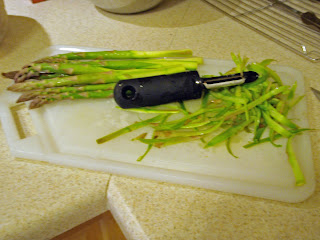I never thought that I would be blogging about the effects of asparagus on the smell of urine, but here I go!
I got started on this topic one night after my roommates and I enjoyed some steamed asparagus along with our dinner. The discussion arose shortly after dinner about the pungent urine smell that occurs after asparagus consumption. When some of my roommates mentioned never having such odorous urine, I was shocked. I wanted to get to the bottom of this odd occurrence!
While researching this topic, I found many different explanations for the smell or lack of there of. Researchers have described the odor associated with the asparagus phenomenon as a “rotten or boiling cabbage” smell (Mitchell 2001). Some studies suggest that that not every individual exhibits odorous urine following asparagus ingestion as the ability to produce a funky urine smell is genetic (Mitchell, 1989). While other reports claim that odorous, asparagus urine is a universal trait (Lison et al., 1980).
However, there is yet another twist to this story. Another study was performed to test the hypothesis that the excretion of odorous substances in the urine was universal, but the ability to detect the odor varied from person to person. This could be due to a specific smell hypersensitivity. Results showed that those that could smell the “rotten or boiling cabbage” odor in their own urine could smell it in the urine of everyone else who consumed asparagus (Lison et al., 1980). Only 10% of the 307 subjects were able to smell the odorous urine. This research study suggests that not everyone has smell receptors that are sensitive tor methanethiol, the culprit of the stinky asparagus urine.
So I decided to do a test of my own, I surveyed fifteen friends and family to find that only 60% could detect an odor in their urine. But now the question is…are they lucky enough to possess the gene to produce the smell or are they gifted with hypersensitive noses?
This great debate requires further investigation. But for now researchers have concluded that “some people are excretors while others are nonexcretors; some people are perceivers (able to smell the odor) while others are nonperceivers” (Sugarman and Neelon, 1985).
Works Cited:
Lison M, Blondheim SH, Melmed RN(1980) A polymorphism of the ability to smell urinary metabolites of asparagus. Br Med J 282:1676–1678.
Mitchell SC(1989) Asparagus and malodorous urine. Br J Clin Pharmacol 27:641–642.Medline
Mitchell SC. Food indiosyncrasies: beetroot and asparagus. Drug Metabolism and Disposition 2001;29: 539-43. [PubMed]
Sugarman J, Neelon FA(1985) You're in for a treat: Asparagus. North Carolina Med J 46:332–334.




























